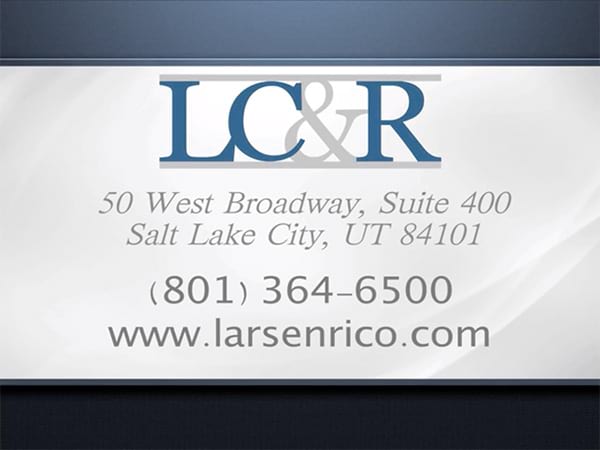Author Archives: Site Administrator
Authority to Bind a Limited Liability Company
Authority to Bind a Limited Liability Company Authority to bind is always an important issue in any commercial transaction. In a member-managed LLC, one would usually expect each member to have authority to bind. In a manager-managed LLC, one would usually expect the manager to have authority to bind. Certain provisions in the 2014… Read More »
Imputation Where the Employee’s Fraud Benefits the Employer
Where a corporate insider’s fraud harms a third party, an important, if not dispositive, issue will become whether the knowledge of the insider committing the fraud is imputed to the corporation. Wardley Better Homes and Gardens v. Cannon, 2002 UT 99, 61 P.3d 1009 and Hodges v. Gibson Prods. Co., 811 P.2d 151 (Utah… Read More »
The Absolute Judicial Privilege
Claims made in a lawsuit may harm a defendant’s reputation, especially where the defendant is a professional, such as a lawyer or an accountant. The judicial privilege bars claims based upon allegations in a lawsuit, as well as statements made before the litigation is initiated, such as in a demand letter, as long as… Read More »
The Adverse Interest Exception – Imputation of a Control Person’s Knowledge to the Corporation
For an agent’s knowledge to be imputed to his principal, the agent’s conduct, even if fraudulent, must in some way benefit the employer. Imputation of a control person’s knowledge becomes critical in fraud cases where the insider’s knowledge will defeat the corporation’s claim, for example against an auditor. If an insider, such as the… Read More »
Allocating Distributions Under Utah’s 2014 Revised Uniform Liability Company Act
For reference, it is estimated that at least 60% of all LLCs formed in Utah do not involve attorneys. Some of these persons who form Utah LLCs on their own – especially small business people and other entrepreneurs – may be very surprised with the results of what they created without the guidance of… Read More »
The Economic Loss Rule in the Construction Industry in Utah
In addition to common law, the Utah Legislature has codified the economic loss doctrine to make it clear that “an action for defective design or construction is limited to breach of the contract,” including written and unwritten contracts and for “both express and implied warranties.” Utah Code Ann. § 78B-4-513(1)(2012) (emphasis added). Such action… Read More »
The Economic Loss Rule: The Demarcation Line between Contract and Tort
Under Utah law, where the parties have entered into a contract, the economic loss rule may bar tort claims. See, e.g., Davencourt at Pilgrims Landing Homeowners Ass’n v. Davencourt at Pilgrims Landing, LC, 2009 UT 65, ¶ 18, 221 P.3d 234; Moliere v. Option One Mortgage Corp., 2011 WL 5403475 (D. Utah, Nov. 4,… Read More »
The Mandatory Provisions of the 2014 LLC Act Are Not Subject to Oral or Implied Modifications
The 2014 Utah Revised Uniform Limited Liability Company Act, Utah Code Ann. § 48-3a-101, et seq., (the “2014 LLC Act”) governs disputes between and among members of a limited liability company (“LLC”). There are three general types of provisions in the 2014 LLC Act: (1) administrative; (2) mandatory or ‘non-waivable’ (the operating agreement may… Read More »
Oral or Implied Modifications of a Written Operating Agreement of a LLC
The impact of the 2014 Utah Revised Uniform Limited Liability Company Act, Utah Code Ann. § 48-3a-101, et seq., (the “2014 LLC Act”) upon disputes between and among members of a limited liability company (“LLC”) is a topic which could consume days of discussion and debate. This blog is limited to oral or implied… Read More »
Ten Indicia of Fraud
1. You cannot invest money you cannot afford to lose. You have to be able to lose 100% of your investment with a zero impact upon your financial stability. In poker, someone who cannot lose everything he has on the table is playing with scared money. In auto racing, where they drive a car… Read More »


